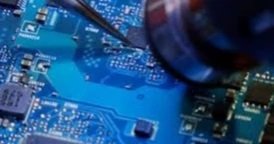Trump’s proposed 100% chip tariff sparks confusion among businesses and global trade partners

President Donald Trump’s recent proposal to impose a 100% tariff on imported computer chips not made in the U.S. is causing widespread uncertainty among businesses and trade partners. While the announcement boosted shares of major semiconductor companies, smaller chipmakers and electronics firms are scrambling to understand what it actually means.
“We’re still waiting for official clarification,” said Limor Fried, founder of New York-based electronics manufacturer Adafruit Industries. Her company sources chips through U.S. distributors as well as directly from suppliers in Taiwan and the Philippines. If those chips are not exempt, she says, it could significantly raise production costs, since semiconductors are among the most expensive parts in their products.
Fried added that in past situations, they often didn’t know the financial impact of new tariffs until receiving the bill, forcing them to adjust prices afterward.
The U.S. imports a relatively small amount of standalone chips; most come already embedded in finished products — like phones or cars — by the time they arrive. What’s unclear now is whether tariffs would apply to chips inside these finished goods.
“The big question is whether the tariff will also apply to components — meaning chips inside devices might require separate tariff assessments,” said Martin Chorzempa, an economist at the Peterson Institute for International Economics.
On Wednesday, Trump stated that companies with ongoing or planned chip manufacturing operations in the U.S. would be exempt from the tariff — even if they’re not yet producing domestically. “If you’re building in the United States of America, there’s no charge,” Trump said during a meeting with Apple CEO Tim Cook.
This was seen as a positive sign for large firms like Intel and Nvidia, as well as global players like Samsung and Taiwan Semiconductor (TSMC), both of which are building factories in the U.S. However, the announcement has left smaller chip producers, particularly those in Europe and Asia with limited involvement in AI, in a state of uncertainty.
German chipmaker Infineon Technologies — a key supplier for the auto industry — said it couldn’t comment due to the lack of official documentation.
Smaller firms may struggle to secure exemptions or invest in U.S.-based manufacturing, Chorzempa noted, because they lack the capital or market influence of bigger players.
It’s also unclear how this policy would interact with Trump’s existing trade agreements, such as those with the EU, Japan, and South Korea, which already include general tariffs capped at 15%.
The Semiconductor Industry Association said Thursday it was “eager to learn more” about the proposal, including which companies or products might be exempt.
Trump’s move comes three months after most consumer electronics were temporarily exempted from the administration’s harshest tariffs. It also follows lessons from the pandemic, when a global chip shortage pushed car prices up and fueled inflation.
Chorzempa warned that if car chips are not exempt, consumers could face hundreds of dollars in added costs per vehicle. “There’s a chip for nearly everything — window controls, infotainment systems, power management — especially in electric vehicles,” he explained.
The Biden administration, by contrast, has supported the domestic chip industry through subsidies. In 2022, the CHIPS and Science Act committed over $50 billion to support U.S. semiconductor manufacturing, research, and workforce development.
Trump has rejected that approach, instead using tariffs as leverage to pressure companies into moving operations to the U.S., even if it risks higher prices and reduced profit margins.
According to Long Le, a business professor at Santa Clara University, Trump’s strategy may encourage more firms to follow Samsung’s lead in building U.S. plants. At the same time, excluding Chinese chipmakers like SMIC and Huawei from exemptions could give the Trump administration more negotiating power in future trade talks with Beijing.



